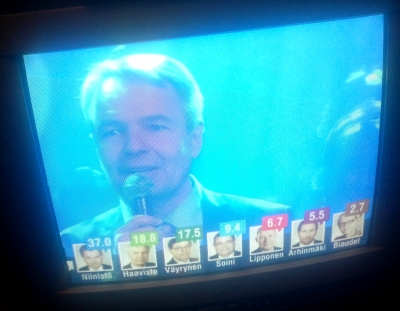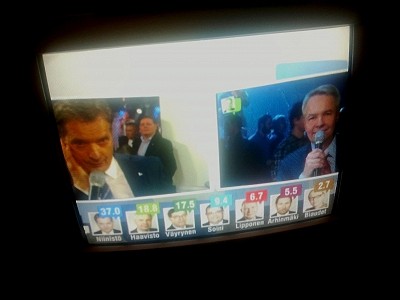Former Conservative Chairman and Speaker of Parliament Sauli Niinistö is facing liberally minded and openly gay MP Pekka Haavisto in the final round of the Finnish presidential election on February 5.
In the first round on January 22 Niinistö got 37 percent of the popular vote and Haavisto got 18.8 percent.
If not so far, this election result has raised Pekka Haavisto, 53, to the small club of openly gay men in top political positions internationally.
Once the election result was clear the conservative chairman and prime minister Jyrki Katainen was quick to explain that both finalists were liberal in their attitudes. However, during the campaign Niinistö and his conservative camp had been gravitating towards some populist conservative views to counter the possible gains by the populist True Finns candidate and other value conservatives.
Many political observers have said Haavisto is in many ways the worst opponent Sauli Niinistö could get.
Much in the final outcome on February depends on how the two remaining candidates will be able to attract the voters now without a candidate. Many of the people who voted for the centrist candidate Paavo Väyrynen and the True Finns candidate Timo Soini are value conservatives, and to get them on board the Niinistö campaign may try to avoid overt liberal tones during the next two week weeks. The political left and the liberals who backed the Swedish people´s party candidate Eva Biaudet are likely to back Haavisto. During the election night there were expressions of support from other political groupings as well.
In the Helsinki metroplex area Niinistö and Haavisto got almost equal number of votes.
Pekka Haavisto is 53 and openly gay. His registered partner Nexar Antonio Flores is originally from Ecuador. Besides his domestic political career Haavisto has been involved in international peace mediation efforts, including duties as a UN representative. Sauli Niinistö, 63, is a former Minister of Finance and Speaker of Parliament. Besides his role in politics he has practised law and worked in international banking.
The conservative candidate Sauli Niinistö has not endorsed equality in marriage legislation. He said during the campaign he was “all for equality”, but refers to the strong opposition in Finland (in some value conservatives circles and within the religious scene) against the concept of marriage being widened to cover same sex couples.
The Finnish Conservative Party has come a long way from its 2010 Party Convention pledge to introduce marriage equality in Finland. The party changed its line in the wake of the landslide victory of populist True Finns in the spring 2011 elections. In the talks leading to the forming of the current coalition government the Prime Minister, Conservative Chairman Jyrki Katainen assured the small Christian Democratic Party that his government would not introduce a Bill to put marriage legislation in Finland on an equal footing. Without such a pledge the Christian Democrats would not have joined the coalition.
There had been some wishful thinking to the effect that Sauli Niinistö could possibly take a broader view and adopt a more liberal line in the marriage issue than Prime Minister Katainen. Such hopes were unfounded though and Niinistö has adhered to the line that he supports equal rights but refers, at the same time, to the opposition seen on the political scene.
As reported earlier, the Conservative Prime Minister Jyrki Katainen did not sign the Member´s Bill circulated to enact the changes in the Marriage legislation, while the chairmen of the other government parties did sign. Other leading conservatives have signed but the Member´s Bill appears not to attract enough support for passage through Parliament.
THE ROLE OF THE PRESIDENT IN FINLAND
The President has no actual domestic political power in Finland, except for some top civilian and military appointments. The President´s main role is to lead the Foreign Policy, in co-operation with the cabinet. Finland is a parliamentary democracy and the cabinet must enjoy the support of Parliament. The President meanwhile is not in a parliamentary responsibility. Earlier the President has decisively more power, and could choose the Prime Minister and call for new elections. The presidential prerogatives have been gradually scaled down since 1994. The President has a lot of authority though and the presidential attitudes towards equality will have repercussions on the domestic societal debate.

